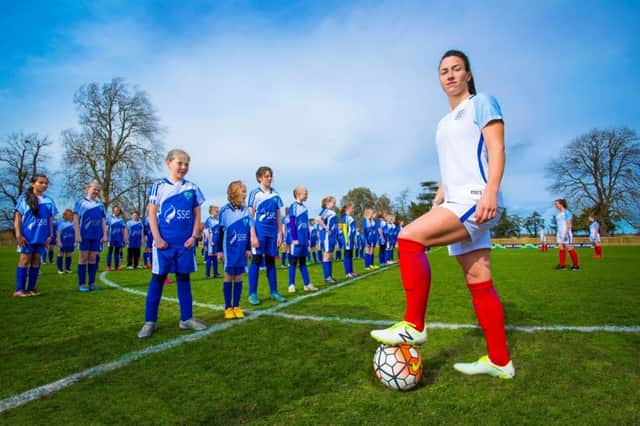Leah is set for big things


Williamson, who was born and raised in Milton Keynes, is a regular for Arsenal – who reached the SSE Women’s FA Cup final by thrashing Sunderland 7-0 in the semi-final on Sunday – in addition to playing age-group football for England.
The 19-year-old is equally at home in defence or midfield and the fact that she has become a lynchpin of the Gunners side is all the more impressive bearing in mind the star-studded, international squad the club have at their disposal.
Advertisement
Advertisement
And Bronze, who herself has 23 senior England caps, believes the teenager has an incredibly bright future in the sport.
“One player who is doing well and has been recognised within the England set-up is Leah Williamson,” said Bronze, speaking at the launch of SSE’s new girls-only football participation programme.
“Any player her age getting in a top team in England, you have to be pretty good.
“For the likes of Leah and Keira Walsh at City to be pushing for a first team spot – when the rest of the team is stacked with English, Scottish, Spanish and Swedish internationals – it is so hard to break into the teams and these girls are doing it so they have a bright future for England.”
Advertisement
Advertisement
In partnership with the FA, Women’s FA Cup sponsors SSE are launching a new girls-only participation programme, designed to increase the number of girls between the ages of 7-14 playing the game.
The programme will see FA affiliated clubs offered grants to help run new girls-only teams and create the next generation of female football players.
And after her own travails playing the sport growing up, Bronze is convinced the participation programme can only benefit the next generation of girls.
“When I was younger I only played with boys,” added the 24-year-old. “My mum took me to an all-boys programme and thankfully the people there knew about women’s football.
Advertisement
Advertisement
“They said to her ‘you need to be taking her to here’ and ‘you need to do this with her’.
“The biggest problem was that once you got to 12 years old, girls couldn’t play with boys anymore.
“I hit 12 and I was like ‘well who am I supposed to play with now’ because the nearest girls team for me was an hour’s drive from where I lived.
“Now there is a girls’ team in the town that I lived in and there are teams all over the country which is great and programmes like this one are so important.”
Advertisement
Advertisement
SSE are proud to be creating more opportunities than ever for girls to play football through the Participation Programme. To find out more about the work SSE are doing in women’s football, visit: www.SSE.co.uk/girls-united